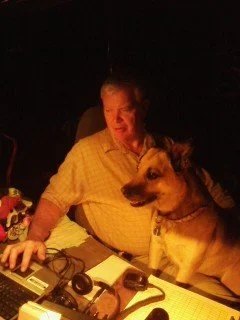End-of-Semester Final Thoughts for Philosophy Students
Hello, Philosophy 103 Students!
I want to, first of all, thank each of you who has diligently worked your way through this course. If you recall what Aristotle had to say about habit-formation, so much of education is about forming good habits, which is as true about a meager philosophy class as it is about your future success in general, no matter what direction you decide to pursue in life from here. This was intentionally a very challenging course, filled with a wide array of challenging materials and a generous amount of analytical/argumentative writing. I firmly believe that people don't really improve unless they are really challenged, and I hope that the deep immersion in regular writing has improved your analytical reading and writing skills, along with your ability to formulate complex arguments.
Thinking back to the Allegory of the Cave in Plato's Republic dialogue, part of having taken the long, hard journey to becoming a philosopher involves a desire to rush back into the darkness of the cave to try to free as many people as possible from the shadows and from their intellectual chains. I would argue that this is the position in which any teacher worth his or her salt finds oneself, hoping to create a spark of philosophical interest that causes students to take up their own lifelong philosophical, intellectual, and literary journeys, to make new philosophers who can then pick up the baton and continue to move humanity and its intellectual progress forward into future generations.
As Plato also indicated, though, not everyone can be freed from the chains of ignorance, darkness, and cultural preconditions; it would not be reasonable, therefore, to expect all of you to self-identify as philosophers from here on out. It is my hope, though, that at least some of you will do so, having seen the value of taking up the examined life in search of well-reasoned answers to the most human of human questions, and continuing the cultural journey of the intellectual and philosophical tradition begun by the earliest thinkers and philosophers and continuing now for well over 2,500 years in the Western tradition. It is important that you see yourselves as being on equal intellectual footing with the greatest thinkers of human history, for you are a philosopher yourself when you engage in intellectually honest debate with the surviving works of those great thinkers. Although it is easy to give in to the easy temptations of cynicism, nihilism, skepticism, pluralism, and relativism, try to have faith in human rationality and our ability to think through the consequences of any given viewpoint, and to come up with increasingly better answers to timeless philosophical questions, even as those questions will remain ever-present in human life for as long as there are human around to ask them.
I encourage all of you to continue reading and writing about the greatest intellectual works the human mind has produced—whether philosophical, literary, or scientific. If you want humanity to improve, you have to stand on the shoulders of greatness, and I hope that this class has sparked a hunger in you to be genuinely autodidactic (self-teaching) in furthering your philosophical and intellectual journey, no matter what practical subjects you end up studying in college and beyond, and no matter what twists and turns your eventual careers may take. There will be many such twists and turns in the uncertainties and vicissitudes of life, and I encourage you to think of philosophy as a kind of safe-harbor in which you can focus on the higher, deeper, and more important aspects of human life—including existential questions of meaning, purpose, authenticity, choices, etc.—when the storms of mere practicality and hardship are looming on the horizon. Philosophy, to me, has been a source of deep inspiration and comfort, and I hope that at least a few of you embrace viewing yourselves as lifelong philosophers, whether you study philosophy formally in the future or not.
Of all the areas of human thought, philosophy involves perhaps the greatest degree of personal change and commitment; it involves a kind of conversion experience from non-philosopher to philosopher (a lover of wisdom) analogous to the conversion of Saul to Paul on the road to Damascus, for those of you with a theological background. Although it is possible to read and write about philosophical matters in the abstract, doing so without this deep personal and intellectual commitment to the truth, and to following rationality and good arguments wherever they may lead you, is to do so only vacuously, lacking in substance (like a game of Sudoku perhaps—intellectual but ultimately meaningless). I hope you have seen that ethical matters cut right to the heart of the deepest questions of human nature, personal identity, meaningfulness, morality, values, and authenticity. And thus they should resonate as deeply as anything else does in your intellectual, academic, and professional careers.
I hope you are also impressed with the sheer diversity of moral and ethical reflections, and resulting forms of human life, that have occurred throughout human history and occur in our very diverse, global world today. It is all-too-easy to remain in our intellectual and cultural comfort zones without taking the time to examine human life from this plurality of perspectives and experiences. So I encourage each of you to go forward into the world with your eyes genuinely open to the endless possibilities of human existence and to use the very best of human reason, your moral and ethical sensibilities, your adventurousness and spiritedness, and your intellectual capacities to live the fullest possible human lives, and to keep the spirit of progress that has so driven western culture in recent centuries (despite the recent political and social turmoils threatening to spawn a new intellectual dark age) moving forward for the sake of the richness and fullness of your own lives, and for the sake of generations yet to come.
I hope you also see, perhaps through the eyes of Nietzsche and the existentialist philosophers from the course, the various ways in which culture, social, political, and even familial pressures can have a destructive effect on your own personal and intellectual authenticity. Looking your own worldview squarely in the face to decide what to hold on to and what to reject, for solid and well-grounded intellectual reasons, is perhaps the hardest task one can take up—but one that is essential to being a real philosopher, to pursuing the truth even when that truth is uncomfortable, unprecedented, or unfamiliar. I hope you have seen in the course materials the many, many ways of approaching morality that is genuinely objective (whether through a rule-based Kantian lens, through a consequentialist/utilitarian lens, or through the lens of virtues and character development), and also the deep tension between objective morality and personal/individual/subjective authenticity, an irreconcilable tension in any moral or ethical system.
I know that many of you have a long academic journey ahead, from finishing community college, to a four-year degree, to grad school and beyond, to say nothing of the long career road ahead for many of you. Although this class isn't a poetry class, I will leave you with a couple of short rhymes from Friedrich Nietzsche as inspiration to keep pressing on even when the journey gets rough (which I understand, having taken the road before that you are now taking):
Upward (by Friedrich Nietzsche):
'How do I best get to the top of this hill?'
'Climb it, don't think it, and maybe you will.'
My Happiness (by Friedrich Nietzsche):
Since I grew weary of the search
I taught myself to find instead.
Since cross winds caused my ship to lurch
I sail with all winds straight ahead.
(Nietzsche, The Gay Science, 'Joke, Cunning, and Revenge': Prelude in German Rhymes)
There is much more I could say, but I will leave it at that for the purpose of winding down the course and as many of you are working, this very moment, on putting the finishing touches on your final papers. In these highly practical times in which the value of a philosophical, reflective, intellectual, literary life is often unseen and unappreciated, I hope you can see the value of living a reflective, philosophical life, even as you pursue more practical pursuits. And I hope you have seen what the human mind is truly capable of, for good and bad, for better and for worse, and that it inspires you to keep reading, thinking, reflecting, and writing your way through this all-too-short human life, my own journey through which, as Dante once said in the beginning of the Inferno, is only merely halfway through.
This is such a corny thought, but take it to heart: make the most of every day. I hope your own journeys are even longer than mine remaining in the decades to come. I have had the sad misfortune of outliving a handful of students over the years, a most unnatural occurrence for any teacher or parent, but a good reminder that life is really very, very short. So go out into the world, make amazing things happen for your own lives and for the world at large, but also make some time to participate in what is perhaps the most human of activities: philosophy. We humans are, after all, as Aristotle once called us, the rational animals.
On that note, take good care, everyone, and make the most of your life ahead and of your mind's abilities. As they once said in an episode Star Trek: Voyager, "To the journey!"
Zachary Fruhling







